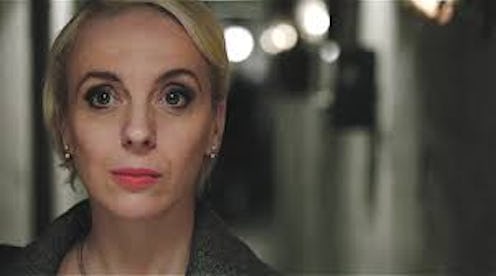
Many fans, as well as Amanda Abbington herself, were utterly shocked by the end of this season of Sherlock , and the many complexities that unfolded, both in the return of Moriarty and the development of the latest addition to Sherlock and Watson's crime fighting team, Mary Morstan. However, the fact that Abbington has said, "I am coming back, but I don’t know in what capacity," is significant, for the future of the show and for the implications it has on the writers' supposed awareness of the fan fiction that abounds in the dark recesses of the internet. The addition of a female character, and a new factor in the main plot of Sherlock, Watson and Sherlock's relationship, blatantly responds to concerns and desires aired online in relation to BBC's juggernaut of an adaptation, and that sensitivity will either be the death knoll or biggest success of Sherlock, depending on how Mary Morstan's continued presence is handled.
For one, it's interesting that many of the points made in Zack Handlen's apt piece on why Elementary is a more successful adaptation than Sherlock are addressed by the backstory and presence of Mary Morstan. One of Handlen's most searing critiques is that, outwith the charming A-list chemistry of Martin Freeman and Benedict Cumberbatch as Watson and Sherlock, none of the supporting characters are anything more than plot devices used to amp up the tension or connection between the two aforementioned protagonists. Despite Mrs. Hudson, Mycroft and Lestrade making frequent cameos in each meaningfully long episode of Sherlock, they are given the absolute minimum in terms of character development, and exist only as accessories to the crucially important dynamic of Watson-loves-Sherlock-can-Sherlock-love-Watson.
The addition of Mary Morstan, as more than the female side piece to the emotional feast that is Watson and Sherlock's relationship, goes a lot of the way towards resolving this issue. Handlen says of Elementary's management of complex characters, "As Joan Watson, ... Lucy Liu gives life to one of the stronger female roles on network television...It’s an equal partnership that allows Watson agency and standing without diminishing Holmes’ gifts." The development of Mary's character over this past season of Sherlock will, I imagine, fulfill a similar role. Although the intensity of Watson and Holmes' devotion to each other will undoubtedly remain the focus of the BBC series, the expertise and importance of Mary, and her unborn child, will serve as a new lens through which to skew the drama that Sherlock relies so heavily upon.
On a more base level, it's also nice to see a woman manage to trump Benedict Cumberbatch's Sherlock and his insufferable need to box all the women he knows into lusty or idiotic tropes throughout the course of the show. Mary is smart and fierce and loving, perhaps a bit dishonest (ok a lot dishonest), but the fact that she is so sharp and sassy will only be lend itself to more out of the box plotting in the upcoming season(or at least let's hope so). Her inclusion is perhaps an indicator of more involvement of secondary characters through the rest of Sherlock.
Additionally, many fans this season lamented that despite Sherlock's new,zanier and distinctly cuddlier writing that seemed uncannily attuned to the murmurings of subreddits, getting what they thought they wanted was perhaps not as sweet as anticipated. Season 3 of Sherlock was, although absolutely enjoyable, more closely related to the fan fictions of it's rabid Cumberbitch posse than to seasons past, and such didn't go unnoticed. As Mark Lawson of The Guardian noted, "Sherlock has always been one of the most web-aware shows... The risk of this approach, though, is that the stories become skewed towards the smallest audience that any programme has: the obsessives. While any successful TV drama these days should generate fan fiction, it can not afford to become entirely fan fiction itself."
The addition of Mary Morstan opens up the future for the script of Sherlock, far beyond the limited homoeroticism of Sherlock and Moriarty, or how adorably confused Sherlock gets when trying to be Watson's best man. Indeed, any successful drama requires more than witty repartee, as Watson and Sherlock were largely reduced to before the finale of this season, and Mary's acidic commitment to both members of Sherlock's dysfunctional crime-solving team gives the show the option of moving beyond the stories Arthur Conan Doyle provided, and perhaps down a path less trodden.
As much as fans love imagining their favorite relationships between characters playing out in the way they want them to, in reality, a show that has more opportunity to shock us, and a distinct willingness to do so, is a show that will survive. I speak bluntly as a Sherlock fan when I say that without the complexity of Mary Morstan's character, and her continued involvement with the two main characters, my interest most surely would have waned by the end of this season. A Sherlock without shock value is a Sherlock not worth watching.
Mary Morstan, despite breaking our hearts half way through Sherlock's brief but emotional season, is the under-appreciated driving force of future seasons, and although it seems Sherlock's almost obsessive adherence to fan desires almost killed it, Mary Morstan, mother of Watson's unborn child, bad ass ex-assassin and generally interesting character, has revived this beloved BBC drama for what will hopefully be many seasons to come.
Image: BBC